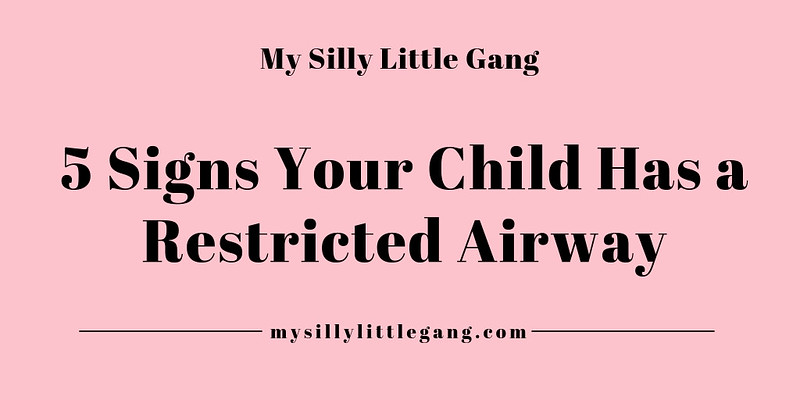Do you worry about your child’s breathing? I do… Here are 5 Signs Your Child Has a Restricted Airway. I hope you find this post helpful.

5 Signs Your Child Has a Restricted Airway

I remember when I brought each of my boys home from the hospital after they were born. I would sit endlessly by their crib making sure they were breathing. What I didn’t know what that I would keep doing this even though they are no longer newborns. All three of my boys have asthma, so I am always constantly worrying about their breathing. Especially when they have colds.
Asthma however isn’t the only thing that can restrict their airway. I was recently sent this article and I knew I had to share it with you. I found it really interesting, and thought you might too.
5 Signs A Restricted Airway May Be Affecting Your Child’s Health
For most people, breathing is automatic – the air goes in, the air goes out, and we don’t even think about it. But for those who have airway problems, it is never that simple – especially for children.
“Children who suffer from air-passage problems never get enough oxygen to the brain, which causes them to never get enough sleep,” says Dr. Stuart Frost, an orthodontist and author of The Artist Orthodontist: Creating An Artistic Smile is More Than Just Straightening Teeth (www.drstuartfrost.com). “They typically do poorly in school and seem inattentive and lethargic.”
Sleep apnea occurs when the airway becomes blocked during sleep, causing a pause in breathing. Those pauses in breathing, known as apneic events, often lead to a diagnosis of obstructive sleep apnea, Dr. Frost says.
He says signs a child may be impacted by airway blockage include:
Snoring. Snoring is caused by the vibrations of excess tissue blocking the airway. When children snore, orthodontists look for a blockage of their airway, from the tip of the nose down to the throat.
Mouth breathing. When there is no room for the tongue to reach the roof of the mouth (the palate), it can rest in the back of the throat and block the airway. Also, when a child’s tonsils and adenoids are enlarged, they can reduce the size of the airway at the back of the throat. “Either situation can make it too hard for children to get enough air when breathing through their nose,” Dr. Frost says, “causing them to open their mouth and jut their lower jaw forward during sleep.”
Clenching or grinding teeth. “If children who are 7 or 8 have baby teeth that are worn from grinding, we know it’s because they’re not getting enough air,” Dr. Frost says. During sleep – and sometimes even when they are awake – their lower jaw is constantly repositioning either side to side or forward to back to open their airway so they can breathe, he says. An expander appliance can widen the nasal passages to help thechild take in more air when breathing through the nose.
Diagnosed with Attention Deficit Disorder (ADD). Some children who have been diagnosed as ADD may actually just have breathing problems during sleep Dr. Frost says. “ If a child is continually not getting enough oxygen during sleep, the brain will eventually kick in a hyper-alert state to stay alive,” he says. “A child whose brain is hyper-alert tends to bounce off the walls.”
Bedwetting: A brain that is starving for oxygen can’t wake a child when the urge to go to the bathroom strikes during sleep. The child will sleep right through any warning sign the brain sends.
Depending on what’s found during an examination, the solutions for a restricted airway could include braces with an expander appliance, along with surgical removal of adenoids or tonsils.
“When sleep apnea is not addressed in childhood, over time it can lead to health issues in adulthood,” Dr. Frost says. “By taking care of it when the person is younger, it can save years of restless nights and half-awake days.”
About Dr. Stuart Frost
Dr. Stuart Frost, author of The Artist Orthodontist: Creating An Artistic Smile is More Than Just Straightening Teeth (www.drstuartfrost.com), is an orthodontist and sought-after speaker who has given seminars, lectures, and speeches throughout the world to dentists and the general public on groundbreaking dentistry. He graduated from the University of the Pacific School of Dentistry and has continued his education at the University of Rochester, where he accomplished a one-year fellowship in Temporomandibular Joint Disorder and a two-year certificate in orthodontics.



Every adult who cares for children should read this. I have a nephew with asthma, and it is scary when they have trouble breathing
.
Great post, I will let my daughter know about these things also. Everyone should be aware of these signs, they may be able to stop a problem before it happens.
Thank you for your words, I absolutely agree. And thank you for sharing this post with your daughter. 🙂
This is such an informative post, thank you so much for sharing this! I honestly did not know about a lot of these and that is worrisome considering I have three kiddos. Fortunately, none of them have ever had these issues though. My oldest definitely has ADD though so I will keep these things in mind.
So I have a friend that has a son who is beign tested for all sorts of things. I am afriad for her son as he struggles alot with his lungs I am praying he will be ok! My son had whooping cough and noen fo the drs took me seriously until he stopped breathign in front of them he made it but it was a logn journey back to health
Sorry to hear, but I’m glad your son is doing better. Prayers for both your family and your friend’s family.